In the early morning of July 29, 2015, we left Milestii Mici after 8 weeks of PST. Eight of us CODs had lived and trained in the village which was our first real home and exposure to life in Moldova.
I can remember rather vividly our arrival the evening of June 3, 2015. We had left Cherry Hill, New Jersey in the morning of June 2, on buses bound for JFK and an overnight flight to Munich, Germany. After about an hour plus layover in Munich, we boarded our flight to Chisinau arriving at about noon local time (or 5:00 a.m. EDT/Ohio time). We had been traveling for about 20 hours.
Upon our arrival in Chisinau, we were bussed to the center of the city for a welcoming reception and afternoon of orientation sessions. Then about 5:00 p.m., we boarded rutieras loaded with all our luggage which was massive since we had packed for a year plus. Most of us had two suitcases, a backpack and carryon. The Peace Corps added to that with a large bag of items for our homes, a medical kit and dictionary. To say we were weighed down is to put it mildly.
In any event we left the city and for the first time saw the Moldovan countryside as our rutiera took us to our village. The view out the window was of beautiful green rolling hills covered with rows of crops, plants and vines. We passed several villages en route arriving at the school in Milestii Mici which was to become our training site. At the school. we were met by a few families, and three volunteers were called from the rutiera, introduced to their host family and left with luggage in tow.
The second stop in Milestii Mici was at the top of the hill by the magazin which would become our gathering place. Again we were met and only two of us were left on the rutiera. Then another woman appeared suddenly, my name was called and I was introduced to my host lady or mama-gazda, which means mother of the house. Together the two of us with all my luggage trudged up the the broken road and down a small dirt lane to the house.
Upon entering the house seemed dark and my room was at the top of a winding staircase. I thought I would never make it with all my luggage, but somehow I managed. I was shown the outdoor facility and then escorted into the kitchen where I met the host man or tata-gazda, father of the house. The three of us sat down to a delicious dinner of fried eggs and potatoes and home baked bread. We ate in silence since all I knew to say in Romanian was hello and thank you. After dinner, I unpacked a few things and collapsed into bed, about 30 hours since we left the hotel in the USA.
Over the next 8 weeks, I and my colleagues would come to appreciate, enjoy and know our host families and the village. Milestii Mici has a listed population of 4,500, but there are probably about 3,500 to 4,000 residents. The houses for the most part seemed fairly large and are enclosed with gates and fences all around them. Just about every house has a large garden and well. Most houses have chickens and/or ducks. A few had horses and/or goats.
In the village there are many abandoned buildings which seem to date to the Soviet era and a few where construction was begun but never completed. There are abandoned houses as well as houses in various states of being built. In some cases people simply do not have the money to finish a house. In others the owners are living and working abroad and send money or work on the house when they have the money and time to do so.
Milestii Mici has a Primaria (Mayor's office) and the post office is a room inside that building. There is no mail delivery. Most of the roads have no names and/or numbers. I am aware of two streets with a street name and number on some of the houses. Actually my host family's house had a plaque with a name and number. Everyone seems to know everyone else and somehow it works.
The village has two schools, a primary school and a middle/high school. The later is where we had our language and COD training. There are three soccer fields, a small park, one Romanian/Russian Orthodox church, and a cemetery. There is a Casa de Cultura or cultural house and the library is two rooms on the side of the cultural house.
Outside of the Milestii Mici Winery, there are no businesses or employers in the village. There is one small market or grocery store, two Magazins which are smaller convenience type stores, and a few Alimentaras which sell food and beverages. There is one Frisuer or hairdrsser where most of us, both women and men, got our haircut. The young lady does nice work and the cost is a fraction of what we pay in the USA.
The village population ranges from infants to very elderly, but is otherwise pretty homogenous. Both Romanian and Russian are spoken, the later especially by the older folks. Needless to say we Americans were highly visible and everyone knew who we were and most probably also knew all about us. Yet people were gracious, kind and welcoming.
Based upon my limited experience and observation, village life is not easy. There is always work to be done and people work very hard. They value their gardens and enjoy fresh fruits and vegetables. Meals are home cooked from scratch and there is homemade wine. The conveniences and services we take for granted in the US are not readily available. Yet there does not seem to be much complaining and life goes on. Families gather for celebrations of the living and the dead. Friends visit and guests are always welcomed with food and drink. They freely share what they have. And Sunday is a day of rest. There is a pattern and rhythm to village life which I was lucky enough to experience.
Upon reflection, as challenging and difficult as life was at times in Milestii Mici, I have to say that I was fortunate to have begun my PC service living in this particular small Moldovan village. From my host family and all those with whom I came in contact, I learned about a different way of life which I appreciate and respect. I am grateful that they shared their home and lives with me. I look forward to returning to Milestii Mici in September for PST Phase 3 training.
 |
| Middle/High School where we had PST training |
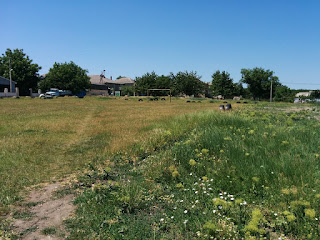 |
| Soccer field I walked across on way to school |
 |
| Primary School |
 |
| Well and Crucifix at crossroads |
 |
| Main door to Orthodox Church |
 |
| Well and pavilion next to Orthodox Church |
 |
| Main Road into Milestii Mici |
 |
| Library |
 |
| Main Door to Primaria |
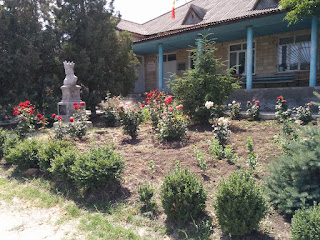 |
| Milestii Mici Primaria |
 |
| Rutiera stop |
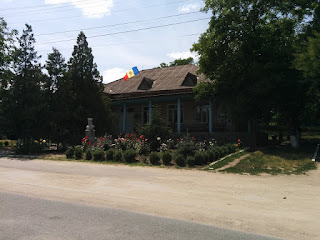 |
| Milestii Mici Primaria |
 |
| Stefan cel Mare |
 |
| One of the many strays we fed |
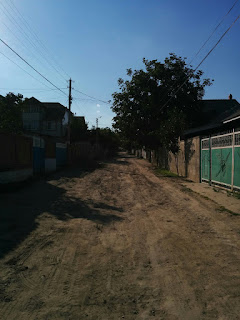 |
| Road to my host house |
 |
| Milestii Mici Folkloric Group |
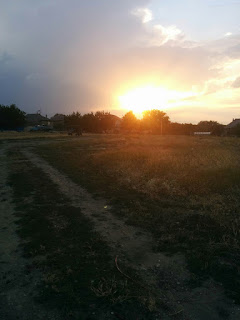 |
| Sunset from path to host house |
 |
| My host house in Milestii Mici |



























Hi Deb, Such a nice recap of your trading weeks. I loved the pictures at the end. I am sure your language improved greatly as youmstayedmwith your host family. Love and prayers continue to be with you!
ReplyDeleteOnce again, thank you for the vivid discription of life in the village. The time in the village, seems to have a pulse to it and your observations seem to have tuned in on the pace. I'm sure that it is hard for you to believe how different your life has become in such a short time. It is, I'm sure, something that you appreciate and will keep with you. Loved the photos. Good luck on the next part of your venture. Shalom Larry
ReplyDeleteYour description of village life is evocative. The gardens must get a lot of attention and work. Although we in the U.S. would view their economy as one of scarcity, it is interesting that the sharing of food and drink is such an important part of social life. Thanks for the descriptions... John Sesek
ReplyDelete